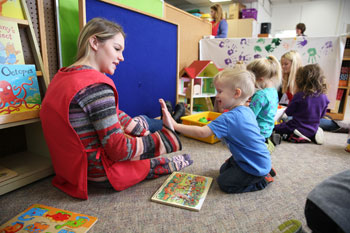
The state’s Early Childhood Care and Education Commission is coming out with recommendations urging Louisiana to invest more in early education for children from birth to age three. The total cost of what’s needed to make quality child care available to all of the state’s economically disadvantaged children is huge, but that doesn’t mean we can’t begin to take steps to address the need.
The positive effects of early education for children in the first few years of their lives has finally become indisputable. By age five, 90-percent of a child’s brain is fully formed and countless studies have shown that early education experiences during those formative years can have a profound and positive impact on children that lasts the rest of their lives.
Studies have also shown that a focus on early education brings with it a huge return on investment not only for the child, but society. Children who are exposed to quality learning experiences are less likely to dropout of high school, require special education services, enter the criminal justice system, or suffer from chronic health issues.
Yet, quality child care is an expensive proposition. Depending on the child’s age, paying $7,000-$8,000 per year is not uncommon. This creates a particular challenge in Louisiana where our high school dropout rates, though improving, are still high and our level of education attainment remains low. The state is making great strides in improving student performance across the board, but the evidence tells us that to really move the needle in the way that we want to, we need to do much more to expand access to quality early education and child care for families that can’t afford it.
In Louisiana, with the nation’s second-highest poverty rate and almost 29-percent of children living in poverty that presents a major hurdle.
According to the commission, about 22,000 economically disadvantaged children in Louisiana are enrolled in quality child care programs out of more that 170,000 who are in need. To address that, the commission recommends an annual compounded investment of more than $80 million per year over the next 10 years in order to have a major impact on access to early learning. At more than $800 million in new money over that timeframe, the investment seems staggering.
But we have to start.
For lessons in how we can do that we need only to turn back the clock 20 years. In the late 1990s the vast majority of children in Louisiana had no access to quality pre-K programs for four-year-olds. But with the creation of the state’s LA-4 early childhood program and a concerted state effort to piece together revenues and work with local school districts, the numbers flipped. Today approximately 90-percent of economically disadvantaged four-year-olds in our state have access to quality pre-K programs. The studies that we have of these children over that period show clear benefits in terms of their education.
Clearly, we can’t instantly enroll all of our younger children in quality child care programs, but where would we be if we hadn’t at least started funding pre-K 20 years ago?
Yes, the challenges seem huge, but does that mean they are insurmountable? Our experience from the past suggests not.
For our citizens, our workforce, and for our society as a whole, the benefits of early education are clear. We won’t get them overnight and we may not be able to invest $80 million per year. But if we are to get them at all one thing is certain. We have to start.
